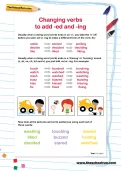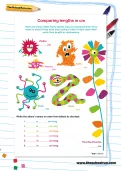Important update from TheSchoolRun
For the past 13 years, TheSchoolRun has been run by a small team of mums working from home, dedicated to providing quality educational resources to primary school parents. Unfortunately, rising supplier costs and falling revenue have made it impossible for us to continue operating, and we’ve had to make the difficult decision to close. The good news: We’ve arranged for another educational provider to take over many of our resources. These will be hosted on a new portal, where the content will be updated and expanded to support your child’s learning.
What this means for subscribers:
- Your subscription is still active, and for now, you can keep using the website as normal — just log in with your usual details to access all our articles and resources*.
- In a few months, all resources will move to the new portal. You’ll continue to have access there until your subscription ends. We’ll send you full details nearer the time.
- As a thank you for your support, we’ll also be sending you 16 primary school eBooks (worth £108.84) to download and keep.
A few changes to be aware of:
- The Learning Journey weekly email has ended, but your child’s plan will still be updated on your dashboard each Monday. Just log in to see the recommended worksheets.
- The 11+ weekly emails have now ended. We sent you all the remaining emails in the series at the end of March — please check your inbox (and spam folder) if you haven’t seen them. You can also follow the full programme here: 11+ Learning Journey.
If you have any questions, please contact us at [email protected]. Thank you for being part of our journey it’s been a privilege to support your family’s learning.
*If you need to reset your password, it will still work as usual. Please check your spam folder if the reset email doesn’t appear in your inbox.
How your child develops in Key Stage 1

Fun-loving, noisy and active: three words that sum up your Key Stage 1 child. In Years 1 and 2, your child is finding their feet at school, and is increasingly comfortable with their teachers and the other children in their class.


Start the Year 1 Learning Programme!
- Weekly maths & English worksheets direct to your inbox
- Follows the National Curriculum
- Keeps your child's learning on track
But this stage can also be a challenge for some children, with their natural exuberance making it hard to adapt to a more formal learning style.
What’s going on in there?
Your Year 1 child is:
- boisterous, enthusiastic and energetic, finding it hard to sit still.
- very competitive, and wants to be the best at everything they do.
- likely to cheat or change the rules of games in order to come first.
- bossy and sometimes unkind to other children.
- prone to telling fibs, especially to get out of trouble.
- highly inquisitive, asking lots of questions and learning through discovery and hands-on projects.
- hungry for new experiences, but likes a stable routine within the school day.
- likely to worry, complain and grumble that life isn’t fair, and is sometimes melodramatic.
Your Year 2 child is:
- permanently on the go, and doesn’t like to stay still to eat a meal or do homework.
- likely to struggle to concentrate at times, and may distract other children when their mind wanders.
- forming close relationships with adults outside the family, such as their teacher or an activity leader.
- shying away from physical contact with parents, particularly in the playground.
- reading and writing with increasing fluency and accuracy.
- challenged by making choices, wanting everything all at once.
- likely to tease and tell tales on their friends.
- prone to blaming you for anything that goes wrong in their life.
Potential pressure points
“In Key Stage 1, there’s more emphasis on literacy and numeracy than there was in Reception, and towards the end of year 2, there’s also the pressure of SATs,” says chartered educational psychologist Julia Busch Hansen. “Children can be sensitive about not being in the top group at school, so it’s important to bolster their confidence by pointing out the things that they are good at.”
Throughout Key Stage 1, your child is likely to have to become increasingly independent at school and cope with harder work, more table-top learning and a greater amount of homework. Friendships can also cause tension, with children trying to exert themselves within groups and teasing becoming a problem.
Warning signs to watch out for
Children of this age aren’t always good at articulating their feelings, so look out for signs of pressure such as tearfulness, sleep problems or bedwetting, nervous habits like stuttering or hair-twiddling, clinginess and sudden fears, such as not wanting to be alone in a room. Problems at school sometimes manifest as tummy aches or headaches: both signs of stress.
“It’s important to work closely with your child’s teacher if you’re noticing behavioural changes at home,” says chartered educational psychologist and educational adviser Susan Brooks. “By keeping the lines of communication open, support can be provided where it’s needed at this crucial early stage.”








